A response to the conventional thinking about demolitions as the antidote to blighted, vacant properties and the negative effects that follow.
Columnist Dan Rodricks has a prescription for the city of Baltimore that departs from conventional thinking about demolishing vacant and blighted properties.
First Rodricks summarizes the arguments that support demolition campaigns:
- "People who call for bulldozing whole blocks seem to think that a developer will suddenly find the flattened area wildly attractive and build new, well-appointed "townhomes" for Baltimore's growing professional class."
- "Some people believe the demolition of old, decrepit Baltimore will create grand opportunities for more green space — vast city parks and sprawling urban gardens."
- "Some believe that, at the very least, more demolition will give areas of the city a psychological lift and a break from crime."
Maryland Governor Larry Hogan himself supports these arguments, as he states in a September 18 op-ed for The Baltimore Sun. In that op-ed, Governor Hogan promises to "advance a plan to knock down blocks of derelict buildings that tarnish communities across Baltimore, replacing them with parks and other open spaces."
Rodricks, however, thinks the governor would better support the city by sending money, rather than bulldozers. In his estimation, revitalization will require a complex policy agenda:
"Resolving Baltimore's vacant house problem involves vigorous housing code enforcement; going to court to seize properties; respecting the rights of homeowners who live in or near blighted properties and, if necessary, relocating them (at significant expense to taxpayers); getting developers to invest; giving financial incentives to homebuyers willing to rehabilitate houses; dealing with neighbors and raw emotions that can sink even small projects with great merit."
FULL STORY: How Hogan can best help city deal with vacants

Planetizen Federal Action Tracker
A weekly monitor of how Trump’s orders and actions are impacting planners and planning in America.

Maui's Vacation Rental Debate Turns Ugly
Verbal attacks, misinformation campaigns and fistfights plague a high-stakes debate to convert thousands of vacation rentals into long-term housing.

Restaurant Patios Were a Pandemic Win — Why Were They so Hard to Keep?
Social distancing requirements and changes in travel patterns prompted cities to pilot new uses for street and sidewalk space. Then it got complicated.

In California Battle of Housing vs. Environment, Housing Just Won
A new state law significantly limits the power of CEQA, an environmental review law that served as a powerful tool for blocking new development.

Boulder Eliminates Parking Minimums Citywide
Officials estimate the cost of building a single underground parking space at up to $100,000.

Orange County, Florida Adopts Largest US “Sprawl Repair” Code
The ‘Orange Code’ seeks to rectify decades of sprawl-inducing, car-oriented development.
Urban Design for Planners 1: Software Tools
This six-course series explores essential urban design concepts using open source software and equips planners with the tools they need to participate fully in the urban design process.
Planning for Universal Design
Learn the tools for implementing Universal Design in planning regulations.
Heyer Gruel & Associates PA
JM Goldson LLC
Custer County Colorado
City of Camden Redevelopment Agency
City of Astoria
Transportation Research & Education Center (TREC) at Portland State University
Jefferson Parish Government
Camden Redevelopment Agency
City of Claremont





























